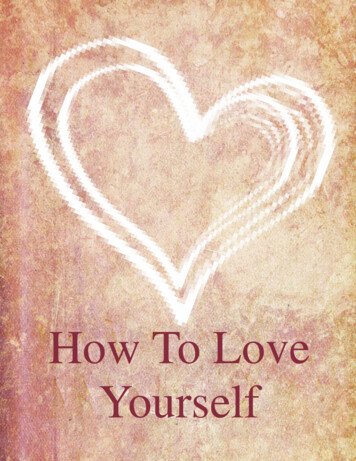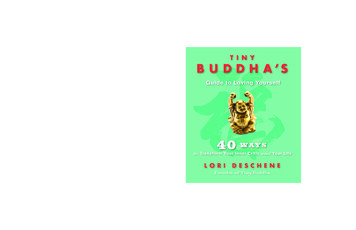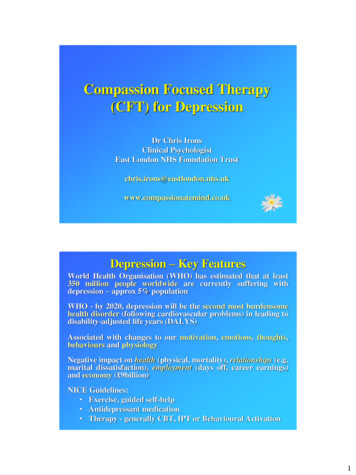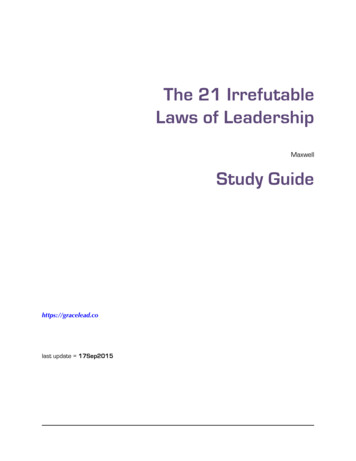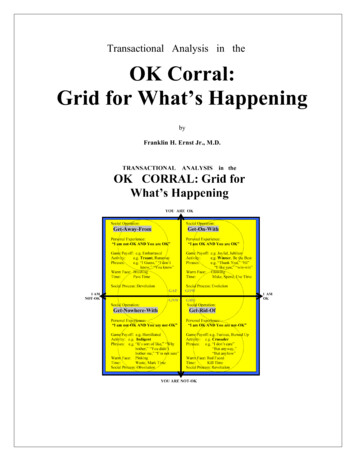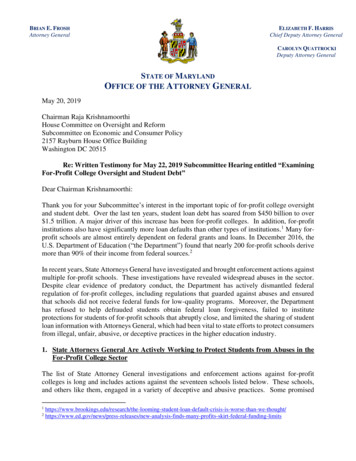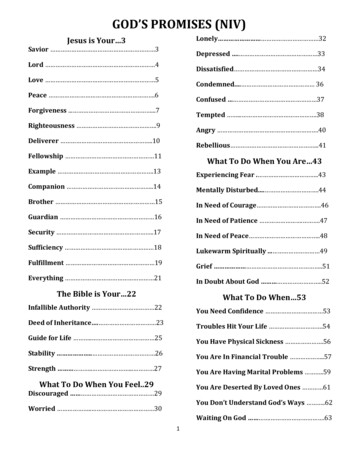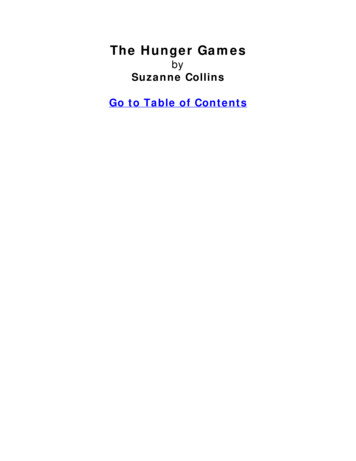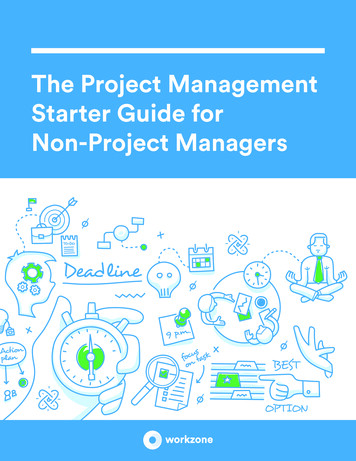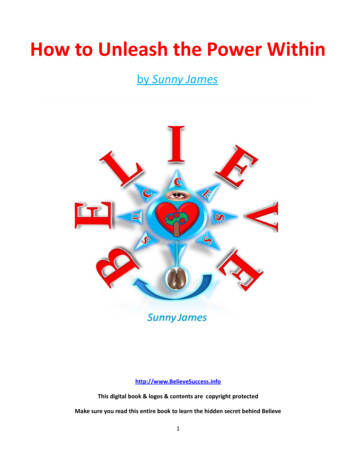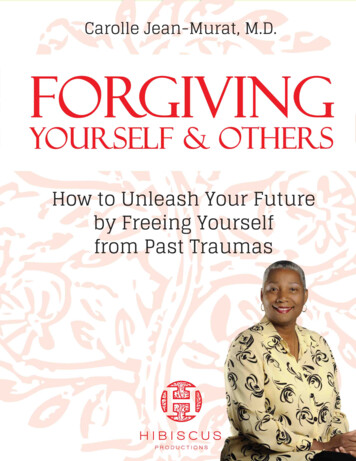
Transcription
Forgiving Yourself & Others:How to Unleash Your Future by Freeing Yourself from Past TraumasCopyright 2012 by Carolle Jean-Murat, MDPublished byHIBISCUS ENTERPRISES, INC.PO Box 2348La Mesa, CA 91941-2348Edited by: Karyn L. Wilkening, Expert Editing, Ink.All rights reserved. No part of this book may be reproduced in any form,except for brief review, without written consent from the author.
Table of ContentsIntroduction 5Step One: Forgiving Yourself . 8The healing Unfinished Business with Myself Exercise 8My Gratitude Letter to Myself Exercise 10Step Two: Forgiving Others . 12The Forgiveness Exercise . 18My forgiveness Exercise . 19Your Forgiveness Exercise Worksheet . 24Conclusion 27Resources . 28About the Author . 29Books by Dr. Carolle .30Carolle Jean-Murat, MD2www.drcarolle.com
“Forgiveness is freeing for yourself, as well as for others. It frees you fromcarrying the burden of past resentments. It allows you to release the past sothat all your energy can be fully available for the present. Forgiveness is theultimate gift you can give yourself.”Author unknownCarolle Jean-Murat, MD3www.drcarolle.com
IntroductionCarolle Jean-Murat, MD4www.drcarolle.com
Forgiving Yourself & OthersIntroductionForgiveness can be defined as “recognizing you have been wronged,giving up all resulting resentment, and eventually responding to the offendingperson with compassion and even love.” Forgiving does not mean that we denywe have been wronged, nor is it condoning or excusing our abuse. The key totrue forgiveness is letting go of the anger and negative feelings associated witha specific person, group, or situation.The notion of forgiveness is not new and has been upheld by many of theworld’s religion. In Christianity, it is embodied by Jesus who practiced andpreached it all the way to the cross. In Judaism, Yom Kippur is a day to atonefor the sins of the past year. One must first seek reconciliation with any personthat one has wronged, righting the wrongs that have been committed againsthim or her if possible. It must be done before Yom Kippur. The angel Gabrielexhorts the Islamic prophet Mohammed to set aside his vengeful anger againstan enemy, and leave justice to God.According to scientists, a lot of anger and hostility are present in oursociety due to unresolved conflicts. This results in a high incidence of domesticabuse, drug and alcohol abuse, violence, divorce, and even crime. We haveseen teenagers from middle class families go on killing sprees in their schools asthe result of unresolved conflicts and anger.Studies have documented the psychological benefits of forgiveness:reduced anxiety, stress, and depression. Individuals who harbor anger increasetheir risk of heart attack, and decrease the response capacity of their immunesystems. Once you forgive, anger is decreased, you feel better about yourself,and personal relationships are enhanced.I have noticed that many of my men and women patients who wereabused physically, mentally or sexually, carry that burden throughout their lives.Their lives are in turmoil, they are suffering from emotional and physicalsymptoms, and they are having spiritual problems. The simple reason is thatbecause of childhood trauma, their spiritual and emotional growth has beenstunted. The angry little child in them is still dealing with childhood issues ofabandonment, neglect, physical, emotional, sexual, and verbal abuse.This burden may stop them from having healthy relationships with theirchildren, peers, and intimate partners. I learned firsthand that in order to befree, a victim has to learn to forgive, or else they will continue to be a victim forthe rest of their life.Carolle Jean-Murat, MD5www.drcarolle.comIntroduction
Forgiving Yourself & OthersI did not realize the importance of forgiveness until I had a panic attack while ona book tour in New York when I was 49 years old. At the age of four, mymother was too poor to raise me. I went to live with a paternal aunt who was, asI saw it, very abusive mentally, physically, verbally and emotionally. Whilesearching how to find solace, I learned that one way to avoid panic attacks wasto forgive her, as well as my mother for not coming to my rescue back then. So Iworked on doing it.I have read that one has to learn to forgive, that letting go will make onea happier and healthier person. However, like many people, I found that hard todo. But it can be done.The key to true forgiveness – forgiving yourself or others – is letting go ofthe anger and negative feelings associated with yourself or others. Forgivingyourself is coming to grips with the fact that you cannot undo the past, thatwhat is done is done. In order to grow and live in balance, one must becommitted to positive self-teachings, such as self-love and self-esteem. Selfforgiveness should then be like a natural extension. Being self-condemning orself-righteous will only make matters worse. Forgiving oneself is just one morehealing aspect of self-love.Are you still carrying the burden of something you have done in the pastand you still regret? Is there someone in your life you need to forgive?Carolle Jean-Murat, MD6www.drcarolle.comIntroduction
Forgiving Yourself & OthersStep OneCarolle Jean-Murat, MD7www.drcarolle.comStep One
Forgiving Yourself & OthersStep One: Forgiving YourselfForgiving yourself may be even more difficult than forgiving others. Overthe years, I have seen many patients who have a physical symptom where thecause could not be determined. After probing, it is not uncommon to discoverthat they were consumed with guilt about something they had done many yearsago. It could be as simple as saying “no” to a friend, or more complicated ashaving an affair or an abortion or even worse, staying in an abusive, intimaterelationship. With tears in their eyes, they would admit they have not been ableto forgive themselves. They go so far as to say "I know God has forgiven me,but I just can’t forgive myself."One of the biggest obstacles to self-forgiveness may be an unconsciousdecision to punish ourselves. By doing so, we not only hurt ourselves, we alsomake those around us suffer along with us. When you don’t forgive yourself, itnot only affects those around you, it can also be detrimental to your body andyour mental health. You will be likely to suffer from difficulty concentrating,anxiety, depression, digestive problems, high blood pressure, irregularbleeding, muscle tension, sleeping and sexual difficulties, weight problems, hotflashes, and heart attacks to name a few.Here are the steps to take to forgive yourself:The Healing Unfinished Business with Myself Exercise1. Write down everything you are ashamed of.2. Write down everything you feel guilty about.3. Write a letter to yourself saying that you forgive yourself for all ofit.4. Write another letter to yourself, but this time, you’ll be writingabout all the wonderful qualities you have and all that you do forothers. This is what is called a “Gratitude Letter to myself.” It’s notabout ego, but about recognizing that you are a person of valueand worth, and that you bring meaning to the lives of others.This, in turn, gives your own life more meaning and depth. Itshould include:a. What are your good qualities?b. What do you do to enrich the life of others?c. What are you grateful for in your life?Carolle Jean-Murat, MD8www.drcarolle.comStep One
Forgiving Yourself & OthersThe healing Unfinished Business ExerciseWrite down everything you are ashamed ofWrite down everything you feel guilty aboutCarolle Jean-Murat, MD9www.drcarolle.comStep One
Forgiving Yourself & OthersWrite a letter to yourself saying that you forgive yourself for all of theabove:What are my good qualities?What do I do to enrich the life of others?What am I grateful for in my life?Carolle Jean-Murat, MD10www.drcarolle.comStep One
Step TwoCarolle Jean-Murat, MD11www.drcarolle.com
Step Two: Forgiving OthersAccording to scientists, a lot of anger and hostility are present in oursociety due to unresolved conflicts. This results in a high incidence of domesticabuse, drug and alcohol abuse, violence, divorce, and even crime. We haveseen teenagers from middle class families go on killing sprees in their schools asthe result of unresolved conflicts and anger.Studies have documented the psychological benefits of forgiveness:reduced anxiety, stress, and depression. Individuals who harbor anger increasetheir risk of heart attack, and decrease the response capacity of their immunesystems. Once you forgive, anger is decreased, you feel better about yourself,and personal relationships are enhanced.Forgiveness can be defined as “recognizing you have been wronged,giving up all resulting resentment, and eventually responding to the offendingperson with compassion andeven love.” Forgiving does not mean that you deny that you have beenwronged, nor is it condoning or excusing your abuse. The key to trueforgiveness is letting go of the anger and negative feelings associated with theperson or situation.I have helped many women over the years in my private practice, thenlater by phone or in person at my Wellness & Retreat Center in San Diego.These women often do not realize that their emotional and physical symptomsare related to unfinished business with a parent, a caregiver, or an acquaintance– dead or alive. In some cases, a stranger may have perpetrated the abuse.Those abused by parents and/or primary caretakers have invisible scarsthat often manifest in: an inability to feel or trust; anxiety problems; depression;relationship problems; eating disorders; and in some cases, alcohol or drugabuse. They live life trying to please others, second-guessing themselves,struggling with perfectionism, lack of confidence, emotional emptiness, andimage/weight issues. They find it difficult to get close without losing a sense ofself.Carolle Jean-Murat, MD12www.drcarolle.com
Abandonment and neglect wounds can occur in so many ways in early years,such as: Being left to cry unattended Being given up for adoption or left in foster care Not being picked up on time from school or elsewhere Having too much responsibility to care for oneself orsiblings Being left alone during an illness Being pushed aside after the birth of a sibling Having an unsupportive parent Having a parent who is emotionally unavailable Having a parent who is emotionally abusive who shamesyou, yells at you or ignores you, makes you feel you are nottrustworthy, controls your way of eating, your appearance,speech, decisions, social life, and other aspects of yourchildhood Verbal, physical, emotional, sexual abuse by a parent,caregiver, or others Parents separating or divorcing A parent living and never returning or not staying in contact A parent with a chronic illness A parent abusing drug or alcohol A parent that stays in an abusive relationship A parent dyingSevere cases involve physical and sexual abuse. The younger the child,the harsher the abuse, the more likely it is to leave deep scars in the child’spsyche.It is not uncommon that unresolved issues with a parent will resurface atany time. They appear as emotional and physical symptoms, and are especiallyevident during stress, or if the parent comes back into their life.Carolle Jean-Murat, MD13www.drcarolle.com
The appearance of symptoms can be likened to the body’s intuitivewisdom reminding the person that these old wounds have to be resolved.Unfortunately, these symptoms are being attributed to PMS, perimenopause,menopause, adrenal fatigue or hormone imbalance.Patient’s StoriesLouise, a 51-year-old woman dealing with unexplained anxiety andfatigue. Her father was an alcoholic, verbally and emotionally abusive toher during her childhood. After her mother passed away, her father wasdiagnosed with early dementia and Louise became his caregiver. As timewent by, Louise became stressed and resentful of the extra demands andadditional work when she had her own household to take care of, andshe developed frightening stress-related symptoms that prompted her tosee doctors.Jo-Ann at 33 was diagnosed with post-partum depressionfollowing the birth of her third child. Her mother was now the perfectgrandmother, doting on her grandchildren with gifts and attention –exactly what Jo-Ann had longed for herself while growing up, but nevergot from her mother.Yvonne, age 49, had unexplained irregular bleeding when hermother, who had left her with her father as a child, came back into herlife wanting to travel to Europe with her teenage grandson.These women were also feeling increasingly depressed, had difficultysleeping, decreased appetite, fatigue, decreased libido, and were easilyoverwhelmed. They had no idea that their physical and emotional symptomswere related to their family situation.Carolle Jean-Murat, MD14www.drcarolle.com
Why is the relationship with a parent or caregiver while growing up soimportant in a woman’s life?Is it a surprise that who we are as adults depends on our relationship withour parents and caregivers during childhood? The basic foundation of how wewill behave as adults starts from the womb to age four at home. During the firstfour years of life – and I believe that it starts in the womb – a child needssomeone who offers comfort, shelter, love, acceptance, and security. If theseneeds are not met by someone, whether a parent or caregiver, it will affect howthat child feels about herself and how she relates to the world.From age four to age eight, it also depends on what happens at school,with friends, and in the neighborhood. However, your parents are the mostinfluential in the development of your self-esteem and how you perceive andvalue yourself. To have healthy self-esteem, a child has to feel lovedunconditionally not for what she does, but for who she is. Children come toexpect that their parents are there to protect them and not cause them tosuffer.With emotional wounds, during stressful moments in adult life especiallywhen feeling rejection, the little hurt child will surface and again experience adeeply engrained pain that manifests in a variety of symptoms and behaviors.Whenever we are in a stressful situation, we feel victimized again andtherefore we become that hurt child, with a response just like a child –arguments, temper tantrums, belligerence, selfishness, spitefulness, etc. It isthat hurt child, the victim, who is also unable to forgive.It is the deepest hurts, especially those from childhood, that are the mostdifficult to face and let go, so the issues are repressed.Working with women, I teach them how to correlate their unresolvedchildhood issues with their present emotional and physical symptoms, and alsotheir relationships. When there are unresolved issues with a parent or caregiver,we will see/seek similar situations over and over in adulthood and not be awareof what is going on. Not letting go of that hurt keeps us from maturingemotionally.Unresolved issues are one of the major causes of unhappiness. Our pastcan hurt all types of relationships with intimate partners, children, friends, workassociates, and our community. Long-term problems may include depression,addictions, and becoming an abuser during adulthood.Addictions that women usually use to ease the pain usually include food,exercise, alcohol, shopping, gambling, sex, etc Carolle Jean-Murat, MD15www.drcarolle.com
Healing unloving or hurtful relationships with our parents is the mostcrucial step to be taken in our lives. It is a most difficult step to take especially ifyou suffered repeatedly at their hands as a child. It is a life-long battle. You willneed to identify and admit parental weaknesses and/or abuse that negativelyinfluence your behavior, and mental, emotional, and spiritual life.In order to be in control of your life, you will have to heal those issues, andforgive. Once you identify the connection, find help to console the little hurt childin you who is your worst critic.Remember that: Most parents wanted the best for their children, but they weredealing with their own issues – possibly of abandonment andneglect – and many did not have anyone to teach them how to benurturing parents. Remember the good moments and appreciate whatever parentalgifts there were. Admit that buried, hurtful issues may be the cause of youremotional and physical symptoms in adulthood and find a way todeal with them and heal them.My Personal StoryI did not realize the importance of forgiveness until I had the panicattack. I learned that one way to avoid panic attacks was to forgive. Ineeded to forgive anyone that I felt had hurt me.After my father and mother separated, he refused to support herfinancially unless we went to live with his mother we called Grandma andhis sister, whom we nicknamed Tatante. We lived in Haiti were there wasno social support for single women with children. I was four years old andmy sister Marie was two when my distraught mother now very sick andexpecting twins took us to live with them. Tatante was adamant thatMarie and I would be raised without contact with my mother’s family.She was strict, physically, emotionally, and verbally abusive to usand was disrespectful to my mother and her family. “They were poor,illiterate, and lived in the back country and danced barefoot in voodootemple” as she repeatedly said with her acerbic voice. I felt like I didn’tCarolle Jean-Murat, MD16www.drcarolle.com
belong anywhere. I resented Tatante for being mean to us, and for howshe treated my mother and her family.Logically, as I grew up, I understood that the way things workedout, I had received a better education, being the first in my mother’sfamily to graduate from high school. But unconsciously, I had neverforgiven my mother for abandoning us as little children. I did notcomprehend the heavy burden I carried, but it became clear many yearslater while working with my therapist after having a severe panic attack.When I started having panic attacks, I was willing to do anythingto make them go away. I decided to try something I had read about. Theidea is to indirectly confront the person you wish to forgive by writingdown everything about how a specific person has wronged you. I usedthis process to forgive Tatante, who was alive and living in Miami, and mymother who was already dead. I have not had a panic attack since. But,like many people, I found that hard to do.Carolle Jean-Murat, MD17www.drcarolle.com
The Forgiveness ExerciseTo do the forgiveness exercise, you do not have to confront the persondirectly. The idea is to indirectly confront the person you wish to forgive bywriting down everything about how a specific person has wronged you. Create a forgiveness list. Take the time to make a list of everyone in yourlife – dead or alive – you feel had hurt you somehow and you are stillholding on to. This includes your mother, father, caregiver or an abuser. Forgive each one whether they are dead or alive using the ForgivenessExercise Worksheet.A word of caution: Be aware that these exercises may bring upuncomfortable feelings, psychological or physical pain, and memories,and are no substitute for professional treatment. You may want toconsult with a qualified medical, psychiatric or psychological professionalbeforehand. If at any time they are disturbing to you, you should stopimmediately and seriously consider seeking the assistance of aprofessionally trained therapist to support you in productively workingthrough this material. Seek counseling when appropriate on how to heal the traumatized innerchild. The adult can consciously forgive but the hurt little child may resist.Carolle Jean-Murat, MD18www.drcarolle.com
My Forgiveness Exercise:My list included my mother, father, Tatante, my 3rd grade teacher and myfirst boyfriend and ex-husband who cheated on me.Regarding my father, for some reasons the healing had already occurredlong time ago. It was 1988. I was enjoying a successful career as an ob-gyn, myartwork was being displayed in local art shows, and I had even participated asAkisha in an instructional belly dancing video that was being sold worldwideand was later featured in 1991 in the popular show Entertainment Tonight – ET.It was then, having realized I’d never learned to play an instrument, that Inot only wanted to learn to play the piano, I also wanted to become a concertpianist!People laughed when I told them about my decision. “You’re too old,”they said. “You have to start playing the piano at a very young age to become aconcert pianist!So, I went to a recital and decided to talk to the pianist. He was 22 yearsold, had been playing the piano since he was four, and practiced at least fourhours a day. By age 14 he was giving recitals and receiving rave reviews.No problem, I thought. I was 38 years old. If I played the piano fourhours a day, in ten years when I turned 48, I would be a concert pianist! When Iexplained those numbers to people, they could more readily see me as an adultconcert pianist.I did not, however, need to give any explanations to my father.One day, I called him in New York where he lived and told him about mydream of becoming a concert pianist. I had given him the nickname TêteChauve or "bald head" since he was a hair-deprived man."Tête Chauve," I asked,"can you visualize me ready to give a recital at Carnegie Hall?I’m wearing a long, black dress. I step out on the stage and walk towardthe grand piano. The public cannot wait for me to begin playing and stand togive me an ovation. Then comes a heavy silence. I sit on the bench, ready toplay. The whole place is expectantly silent.”“Yes!” my father interrupted. “Yes! Make sure I have a good seat!" We laughed.Carolle Jean-Murat, MD19www.drcarolle.com
But I had always resented my father seeing him through the pained eyesof his women, including my own mother. I realized that I’d always regarded himas a man, not as a father. I remembered how when he would come to visit heloved to have me sit on his lap as I excitedly opened my gifts. I would show himmy latest award from school and he would show me his big biceps, built byyears of weight training. When he smiled, his face shone with what I was surewere the biggest, whitest teeth in the world. He reminded me that I was thesmartest girl in the world because I was the daughter of the world's smartestman. This complement always made me giggle and often encouraged me tokeep ahead in school lessons. He promised that I could become anything Iwanted because he would always work hard to pay for our schooling. Then hewould add, with his unique combination of bitterness, hope, and pride "I won'tdo to you what my father did to me. I left my home at sixteen because thatalcoholic old man wasn’t a good father like I am!"On one of his visits, I was so excited by his energy and his promises that Iwanted to offer him something in return. I was doing well in school andcontinued to earn medals for my high marks. I was sure such achievementswould bring hugs and lofty praise from my father on his next visit. I was anxiousto begin my career as a famous and important person, and I was looking for arole model. I decided that Soeur Yvonne, a nun at my parochial school, was agood one.She was one of the most impressive and powerful figures in my world."I am going to be a nun," I proudly announced during my father's next visit."I’ll be an important nun, like Soeur Yvonne!"My father laughed and, lifting me in his arms, held me over his smilingface. "Carolle, you can be anything you want to be," he beamed. "If you wantto be a nun, then you shall be a nun!"There was nothing I could not be, because there was nothing he couldnot make happen.That was when I began to see the many sacrifices he had made for Marieand I; how his own father was abusive to him and sent his son out to fend forhimself. I came to understand that my father based his decisions on his ownbackground; he knew poverty but and was determined that his daughters wouldhave a better life.After I hung up the phone, I started to cry. I realized that I was one of theluckiest girls in the world. As long as I could remember, my father had alwayssupported me in all my endeavors.He had always had blind faith in me, making me believe that I could doanything.Carolle Jean-Murat, MD20www.drcarolle.com
That day, for the first time, I saw my father through the eyes of a gratefuldaughter who was fortunate to have him in my life. He had never had a chanceto receive an education, but he made sure that I got one, many times at his ownexpense.I felt so sorry that it had taken me so long to recognize the blessing ofhaving him as my father.I called him back right away. "Tête Chauve," I said. “I want to tell youthat I love you, and that I am proud that you are my father. I want to thank youfor all the sacrifices you have made on my behalf. I want you to know that I willbe forever grateful for everything you have done for me."The next day, I took the board certification I’d received from theAmerican College of Obstetricians and Gynecologists from my office and founda printing shop that was able to make a copy look like an original.I put it in a nice frame. On the back, I wrote: “To you, Tête Chauve,we both deserve this! Love always. Your daughter, Carolle.”Healing with mother and TatanteI used the forgiveness exercise to forgive Tatante, who was alive andliving in Miami, and my mother who was already dead.How I did it:1. First write down everything you feel that the person has done wrongto you. Get it all out -- be as specific as possible.Dear Tatante,You hurt me every time you say something bad about my mother.You hurt me when you refused to let me see my mother or herrelatives. You hurt me every time you criticized me, whether or notI had done right or wrong, or just did not meet your standards.Dear Mom,Carolle Jean-Murat, MD21www.drcarolle.com
You never should have let Marise and I stay with Tatante. Youshould have fought for us, rescued us, even though it would havemeant that we would not have gotten as good an education.2. Now practice telling the person everything that you want him or herto know. If the hurt was done when you were a child, then theconfident grown-up you – who is not afraid of that person – takes theshy, scared child onto your lap and has the child tell it all.When it was time to read my list to Tatante, I realized thatthe hurt started when I was four years old. I held Ti-Ca – my nicknameas a little girl – on my lap and had Ti-Ca read the list to Tatante.Since I became conscious of the resentment I had towards mymother as an adult, I saw myself seated in her living room, as an adult,talking to her face to face.3. Write down positive things that the person who hurt you has done foryou. If there are none, that’s okay. If you keep thinking, you mayremember something kind that this person has done for you.I was surprised to realize that Tatante had done many positivethings for me. For many years, we stayed at her house. When my fathercould not afford it, she would feed us, pay our tuition, pay foruniforms, books, tutors, and the endless things we needed for school.Regarding my mother, I can only remember her look ofhopelessness when I visited her. Because of that look, I decided Iwould never put myself in her situation. This gave me the courage toovercome many obstacles, to become successful, independent, andwell educated, so I would never have to make similar sacrifices.4. Lastly, practice telling the person that you forgive him or her, becausethey did not know any better.“Tatante,” “Maman,” I said, “I forgive you since you did notknow any better.”Carolle Jean-Murat, MD22www.drcarolle.com
By the time I got to this part. I was sobbing. I cried for a while, letting thetears clean my soul. This was the first time I ever really shed tears for mymother, since she died almost a year earlier. When I was done crying, Ifelt a huge weight had been lifted from my heart and my brain.The next time I went to Florida to visit Marise and Tatante, we hada great time together. I saw Tatante one more time, six months laterduring a stopover on the way to Haiti. She prepared my favorite mealand helped me rearrange my luggage. I told her that I loved her and Ireally meant it. Three weeks later, she became gravely ill and passedaway. I went back for her funeral. At the wake, I looked at her lyingmotionless in her coffin. There was no more hurt, no more hate, just loveand gratitude. Tatante never understood why I resented her. She felt thatshe had done her best. Forgiving her not only gave me a chance to healmyself, it gave her the opportunity to enjoy the company of a niece sheloved and for whom she had made many sacrifices.Carolle Jean-Murat, MD23www.drcarolle.com
Your Forgiveness Exercise1. First write down everything you feel that this person has donewrong to you. Get it all out. Be as specific as possible.2. Now practice telling that person everything you want him or herto know. If the hurt was done when you were a child, then theconfident grown-up you – who is not afraid of that person – takesthe shy, scared child onto your lap and has the child tell it all.Carolle Jean-Murat, MD24www.drcarolle.com
3. Write down positive things that your mother has done for you. Ifthere are none, that’s okay. If you keep thinking, you mayremember something kind that this person has done for you.4. Lastly, practice telling your mother that you forgive her, becauseshe did not know any better.Carolle Jean-Murat, MD25www.drcarolle.com
ConclusionCarolle Jean-Murat, MD26www.drcarolle.com
ConclusionIn his book The Anxiety & Phobia Workbook, Dr. Edmund J. Bournewrites about the significance of developing one’s sp
true forgiveness is letting go of the anger and negative feelings associated with a specific person, group, or situation. The notion of forgiveness is not new and has been upheld by many of the world’s religion. In Christianity, it is embodied by Jesus who practiced and preached it all the
